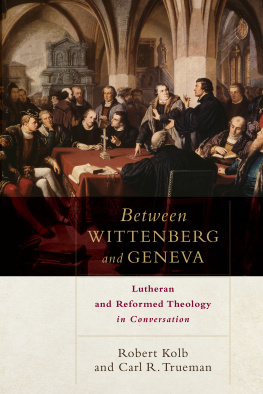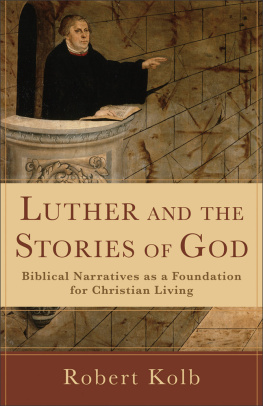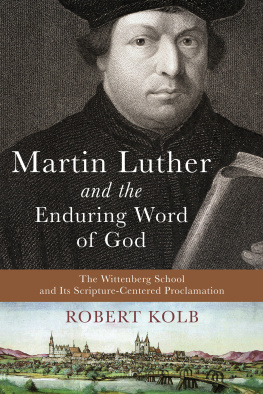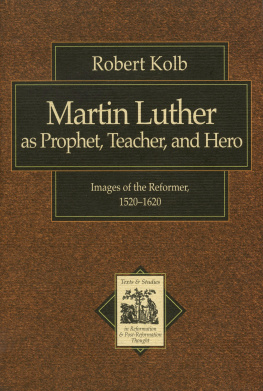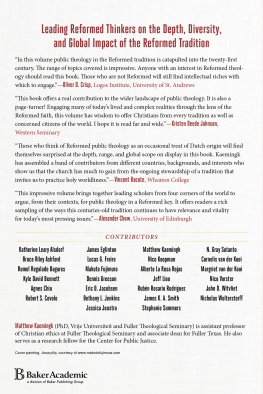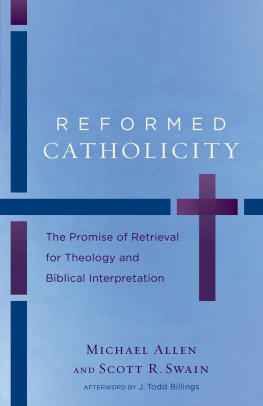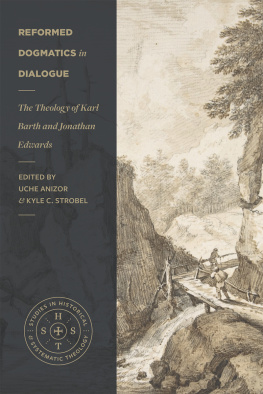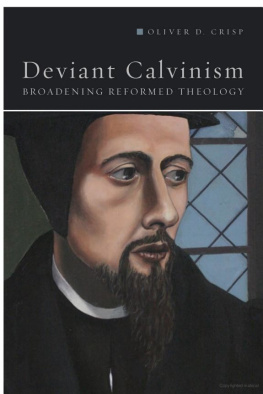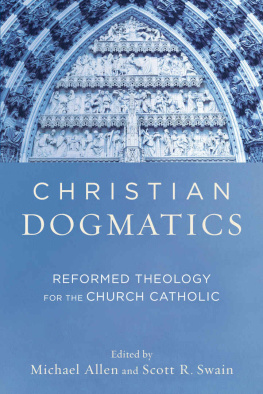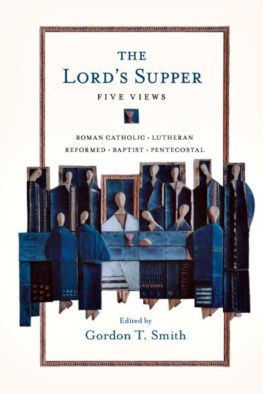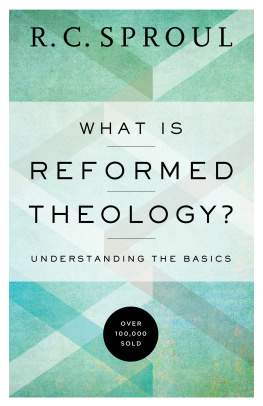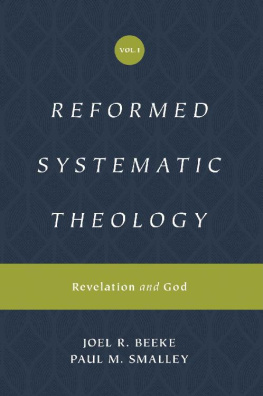Robert Kolb - Between Wittenberg and Geneva: Lutheran and Reformed Theology in Conversation
Here you can read online Robert Kolb - Between Wittenberg and Geneva: Lutheran and Reformed Theology in Conversation full text of the book (entire story) in english for free. Download pdf and epub, get meaning, cover and reviews about this ebook. year: 2017, publisher: Baker Publishing Group, genre: Religion. Description of the work, (preface) as well as reviews are available. Best literature library LitArk.com created for fans of good reading and offers a wide selection of genres:
Romance novel
Science fiction
Adventure
Detective
Science
History
Home and family
Prose
Art
Politics
Computer
Non-fiction
Religion
Business
Children
Humor
Choose a favorite category and find really read worthwhile books. Enjoy immersion in the world of imagination, feel the emotions of the characters or learn something new for yourself, make an fascinating discovery.
- Book:Between Wittenberg and Geneva: Lutheran and Reformed Theology in Conversation
- Author:
- Publisher:Baker Publishing Group
- Genre:
- Year:2017
- Rating:3 / 5
- Favourites:Add to favourites
- Your mark:
- 60
- 1
- 2
- 3
- 4
- 5
Between Wittenberg and Geneva: Lutheran and Reformed Theology in Conversation: summary, description and annotation
We offer to read an annotation, description, summary or preface (depends on what the author of the book "Between Wittenberg and Geneva: Lutheran and Reformed Theology in Conversation" wrote himself). If you haven't found the necessary information about the book — write in the comments, we will try to find it.
Between Wittenberg and Geneva: Lutheran and Reformed Theology in Conversation — read online for free the complete book (whole text) full work
Below is the text of the book, divided by pages. System saving the place of the last page read, allows you to conveniently read the book "Between Wittenberg and Geneva: Lutheran and Reformed Theology in Conversation" online for free, without having to search again every time where you left off. Put a bookmark, and you can go to the page where you finished reading at any time.
Font size:
Interval:
Bookmark:
2017 by Robert Kolb and Carl R. Trueman
Published by Baker Academic
a division of Baker Publishing Group
PO Box 6287, Grand Rapids, MI 49516-6287
www.bakeracademic.com
Ebook edition created 2017
All rights reserved. No part of this publication may be reproduced, stored in a retrieval system, or transmitted in any form or by any meansfor example, electronic, photocopy, recordingwithout the prior written permission of the publisher. The only exception is brief quotations in printed reviews.
Library of Congress Cataloging-in-Publication Data is on file at the Library of Congress, Washington, DC.
ISBN 978-1-4934-1145-0
Convergences and divergences on major theological themes of both Lutheran and Reformed traditions are brought to light. Irenic in spirit and lucid in writing, this book is a welcome theological ressourcement ; it will also fructify true ecumenical dialogue. Edification and illumination are the gifts of Kolb and Trueman, for whom readers can be grateful.
Dennis Ngien , Tyndale University College and Seminary, Toronto, and Wycliffe College, University of Toronto
Robert Kolb and Carl Trueman are not only experts in their respective traditions, but they are both marvelous writers. This is a needed book. Too many who adhere either to the Lutheran confession or the Reformed have not taken time to read their opposites. Further, as Trueman notes in the preface, most Evangelicals ignore issues that are vital to the two great confessional Reformation traditions. Well-informed readers may quibble here and there, but all must admit that this volume is a great contribution to genuine ecumenicity, which requires honest exposition, inquiry, and dialogue rather than the papering over of genuine differences. This volume is much to be commended.
R. Scott Clark , Westminster Seminary California
Cover
Title Page
Copyright Page
Endorsements
Preface
Abbreviations
1. Scripture and Its Interpretation
2. Law and Gospel
3. The Person and Work of Christ
4. Election and the Bondage of the Will
5. Justification and Sanctification
6. Baptism
7. The Lords Supper
8. Worship
Conclusion
Scripture Index
Name Index
Subject Index
Back Cover
C ARL R. T RUEMAN
T his book owes its origin to two independent conversations that Bob Kolb and I had with Dave Nelson at Baker Publishing Group some years ago. Each of us was concerned about a couple of related phenomena that we had noticed among seminary students. The first was the failure of many of them to understand the differences between being confessional and being Evangelical. The second was a similar failure to understand the differences between Lutherans and Reformed. Indeed, I have lost count of the number of times over the years that I have heard students refer to Luther as Reformed and had to correct them by indicating that he was a Lutheran reformer, not Reformed. What both Bob and I wanted to do was to write a book that would explain the differences between our two communions.
Both of the problems we noted above with regard to our students derive from their not really understanding the Lutheran and Reformed confessional traditions. Neither tradition is really part of the broader movement of Evangelicalism, which has its roots in the revivalsand revivalismof the eighteenth century. Evangelicalism tends to regard as matters of little importance those things that are vital to the confessional traditions of the Lutheran and Reformed churches. However, even many students from within Lutheran and Reformed churches have not been well catechized in their own tradition and have therefore been left vulnerable to more Evangelical streams of Protestant life. This weakens their confessional identity.
For example, Evangelicals tend to focus on soteriology and fail to grasp why sacramentsthe major point of dispute between the two magisterial Reformation traditionsare of any great moment. Indeed, when they do take a strong stand on such, it is typically in the form of an odd antisacramentalism that rejects infant baptism, a point that decisively separates them from the confessional Lutherans and Reformed. Yet, perhaps attracted by the heroic stature of Luther or Calvin, many Evangelicals try to appropriate these figures for their own cause, selecting those doctrines they appreciate and unwittingly domesticating the Reformers and the Reformation in the process.
This problem is typically most evident in classes dealing with the Marburg Colloquy (1529), the famous face-to-face confrontation between Luther and Zwingli. When students hear that Luther was prepared to refuse to reach full agreement with the Reformed because of his insistence on the real presence of Christ in the Lords Supper, they areto put it mildlyconfused and sometimes distressed. That the sacrament would be a sufficient basis for such drastic action seems to them absurd or an act of willful pride or a vestige of medieval Roman Catholicism that Luther somehow failed to reject. In sum, instincts shaped by the antisacramental culture of modern Evangelicalism render Luthers stand incomprehensible.
It was this problem that led Bob and me to talk separately to Dave, with the idea that it might be helpful to produce a book outlining Lutheran and Reformed positions on various doctrines in a manner that would help students to see what is at stake both in the confessional disagreements between our two traditions and in the differences between the confessional Protestantism that finds its origin in the Reformation and the Evangelicalism that originates in the revivalism of the eighteenth century. But we also wanted to do so in a manner that, while not minimizing or relativizing those differences, avoided the bitterness that has often characterized such engagement in the past. The years since 1529 have seen more than their fair share of recrimination, bitterness, and mutual misrepresentation by both sides. We wanted to produce a book reflecting our commitment to the catholic faith of the Christian church and our respect and affection for each other as Christian brothers who serve the same Lord and Savior.
To accomplish this task, we chose a set of eight topics on which there is both considerable overlap and at times significant disagreement between our two traditions. Readers will see the latter most obviously in those chapters dealing with the person of Christ, baptism, and the Lords Supper. Christ and the Lords Supper are, of course, interconnected topics and were the primary historic points of conflict between Lutheran and Reformed. Indeed, they remain so today. But the reader will also see that, along with the sharp points of disagreement, there is significant commonality on many elements of the faith. For example, justification by grace through faith is crucial to both traditions. In fact, it is hard to imagine what the Reformed faith would look like if it had not borrowed this basic insight from Luther. On that point, all Reformation Protestants are the sons and daughters of Dr. Martin, and all should gratefully acknowledge that fact.
Bob and I wrote all the essays in order to present our confessional traditions in a consistent manner. Our contributions are paired in each chapter, with Bobs portion coming first, but they have not been written so as to be in direct, point-by-point dialogue with each other. Our hope is that they thus represent the starting point for future dialoguein the classroom, in the local church context, perhaps even at the denominational level. Both Lutheran and Reformed traditions are churchly. While we appreciate some aspects of Evangelicalism, we believe that the only real way of engaging in true ecumenical discussion with a view to greater unity among Christians is to do so within the church itself and between denominational bodies.
Font size:
Interval:
Bookmark:
Similar books «Between Wittenberg and Geneva: Lutheran and Reformed Theology in Conversation»
Look at similar books to Between Wittenberg and Geneva: Lutheran and Reformed Theology in Conversation. We have selected literature similar in name and meaning in the hope of providing readers with more options to find new, interesting, not yet read works.
Discussion, reviews of the book Between Wittenberg and Geneva: Lutheran and Reformed Theology in Conversation and just readers' own opinions. Leave your comments, write what you think about the work, its meaning or the main characters. Specify what exactly you liked and what you didn't like, and why you think so.

